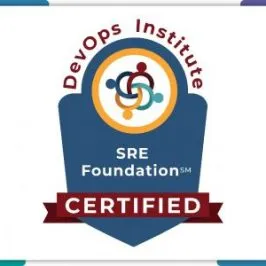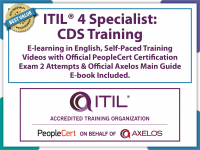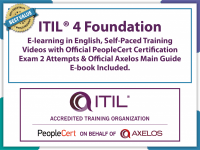Today’s organisations deal with a higher volume of change in a more complex tech environment leading to a higher risk of outages and incidents. IT teams must improve service reliability and system resiliency. With automation and observability becoming key factors for more efficient and rapid deployments, the SRE profile has become one of the fastest-growing job roles.
The SRE (Site Reliability Engineering) Foundation℠ course is an introduction to the principles & practices that enable an organization to reliably and economically scale critical services. Introducing a site-reliability dimension requires organizational re-alignment, a new focus on engineering & automation, and the adoption of a range of new working paradigms.
The course highlights the evolution of SRE and its future direction, and equips participants with the practices, methods, and tools to engage people across the organization involved in reliability and stability evidenced through the use of real-life scenarios and case stories. Upon completion of the course, participants will have tangible takeaways to leverage when back in the office such as understanding, setting and tracking Service Level Objectives (SLO’s).
The course was developed by leveraging key SRE sources, engaging with thought-leaders in the SRE space and working with organizations embracing SRE to extract real-life best practices and has been designed to teach the key principles & practices necessary for starting SRE adoption.
This course positions learners to successfully complete the SRE Foundation certification exam.
With Site Reliability Engineering (SRE) Foundation, you will learn about:
- SRE Principles and Practices
- Service Level Objectives and Error Budgets
- Reducing Toil
- Monitoring and Service Level Indicators
- SRE Tools and Automation
- Anti-Fragility and Learning from Failure
- Organisational Impact of SRE
- SRE, Other Frameworks, The Future
Benefits for Organisations
- Enhanced stability and reliability of services
- Better understanding of how production services work
- Increased balance between technical investment in reliability and customer experience
- Greater appreciation of the operational impact of services in development teams
- Improvements in staff morale and retention
Benefits for Individuals
- Improved work balance with ring-fenced time for improvement
- Less stressful on-call experiences and a reduction in overall call-out volumes
- Broader skills-based capabilities that leverage the latest in automation
- Improvement in workplace culture
- Opportunities for “shifting left” and helping to ensure development teams deliver more reliable services
AUDIENCE
The target audience for the SRE Foundation course are professionals including:
● Anyone starting or leading a move towards increased reliability
● Anyone interested in modern IT leadership and organizational change approaches
● Business Managers
● Business Stakeholders
● Change Agents
● Consultants
● DevOps Practitioners
● IT Directors
● IT Managers
● IT Team Leaders
● Product Owners
● Scrum Masters
● Software Engineers
● Site Reliability Engineers
● System Integrators
● Tool Providers
LEARNER MATERIALS
● Learner Manual (excellent post-class reference) including:
○ Course slideware
○ Value Added Resources
○ Glossary
● Participation in exercises and discussions designed to apply concepts
● Case stories
● Access to additional sources of information and communities
CERTIFICATION EXAM
Successfully passing (65%) the 60-minute examination, consisting of 40 multiple-choice
questions, leads to the SRE (Site Reliability Engineering) Foundation certificate. The
certification is governed and maintained by the DevOps Institute.
COURSE OUTLINE
● Course Introduction
○ Course Goals
○ Course Agenda
● Module 1: SRE Principles & Practices
○ What is Site Reliability Engineering?
○ SRE & DevOps: What is the Difference?
○ SRE Principles & Practices
● Module 2: Service Level Objectives & Error Budgets
○ Service Level Objectives (SLO’s)
○ Error Budgets
○ Error Budget Policies
● Module 3: Reducing Toil
○ What is Toil?
○ Why is Toil Bad?
○ Doing Something About Toil
● Module 4: Monitoring & Service Level Indicators
○ Service Level Indicators (SLI’s)
○ Monitoring
○ Observability
● Module 5: SRE Tools & Automation
○ Automation Defined
○ Automation Focus
○ Hierarchy of Automation Types
○ Secure Automation
○ Automation Tools
● Module 6: Anti-Fragility & Learning from Failure
○ Why Learn from Failure
○ Benefits of Anti-Fragility
○ Shifting the Organizational Balance
● Module 7: Organizational Impact of SRE
○ Why Organizations Embrace SRE
○ Patterns for SRE Adoption
○ On-Call Necessities
○ Blameless Post-Mortems
○ SRE & Scale
● Module 8: SRE, Other Frameworks, The Future
○ SRE & Other Frameworks
○ The Future
● Additional Sources of Information
● Exam Preparations
○ Exam Requirements, Question Weighting, and Terminology List
What else is included with your exam purchase
This certification offers the free-of-charge Digital Badge service.
The digital badge will allow you to showcase your professional certification acquired through PeopleCert to potential employers, colleagues and your business network. It can be added on your email signature, your CV, your LinkedIn and other social media accounts.





